Factors Influencing Graduate Nurse's Transition into Practice
VerifiedAdded on 2022/08/18
|13
|3865
|16
Literature Review
AI Summary
This literature review examines the factors that influence the transition of new graduate nurses into professional practice. It explores the challenges of transitioning from an academic environment to clinical settings, including transition shock, which encompasses sociocultural, developmental, emotional, intellectual, and physical changes. The review discusses the background of transition shock, the role of clinical placements, and the impact of factors like lack of experienced mentors and performance anxiety. A search strategy was developed using databases like PubMed Central, BioMed Central, and Cochrane Database, with specific keywords and Boolean operators to identify relevant literature published between 2016 and 2020. The findings highlight the phases of transition, nursing perceptions, and the efficacy of simulations and transition programs. Key themes include the importance of peer support, mentorship, and addressing issues like job satisfaction and burnout to improve the transition experience for new graduate nurses. The review emphasizes the need for support from experienced professionals, nursing managers, and policymakers to facilitate a smoother transition and mitigate negative consequences, ultimately improving patient outcomes.
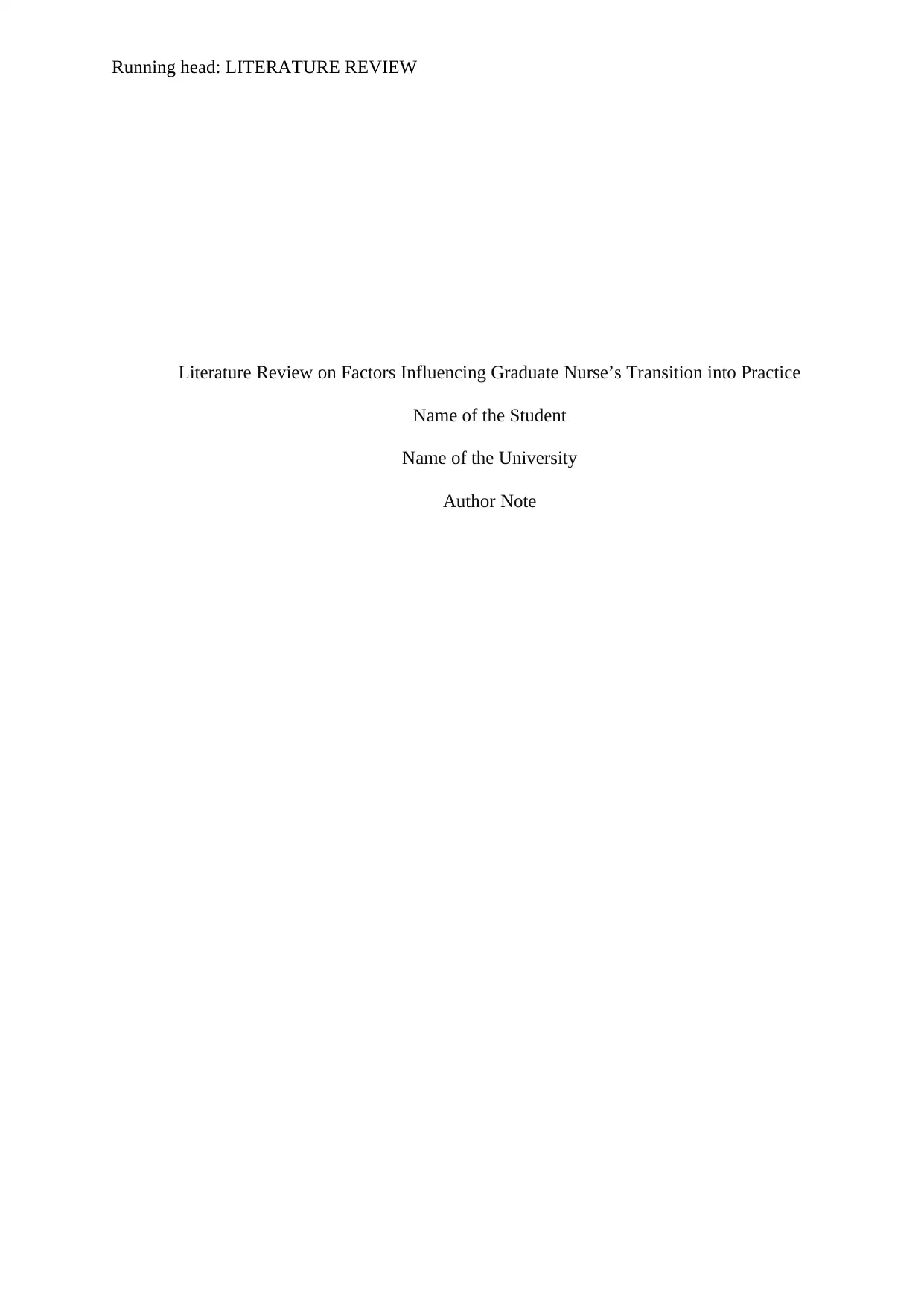
Running head: LITERATURE REVIEW
Literature Review on Factors Influencing Graduate Nurse’s Transition into Practice
Name of the Student
Name of the University
Author Note
Literature Review on Factors Influencing Graduate Nurse’s Transition into Practice
Name of the Student
Name of the University
Author Note
Paraphrase This Document
Need a fresh take? Get an instant paraphrase of this document with our AI Paraphraser
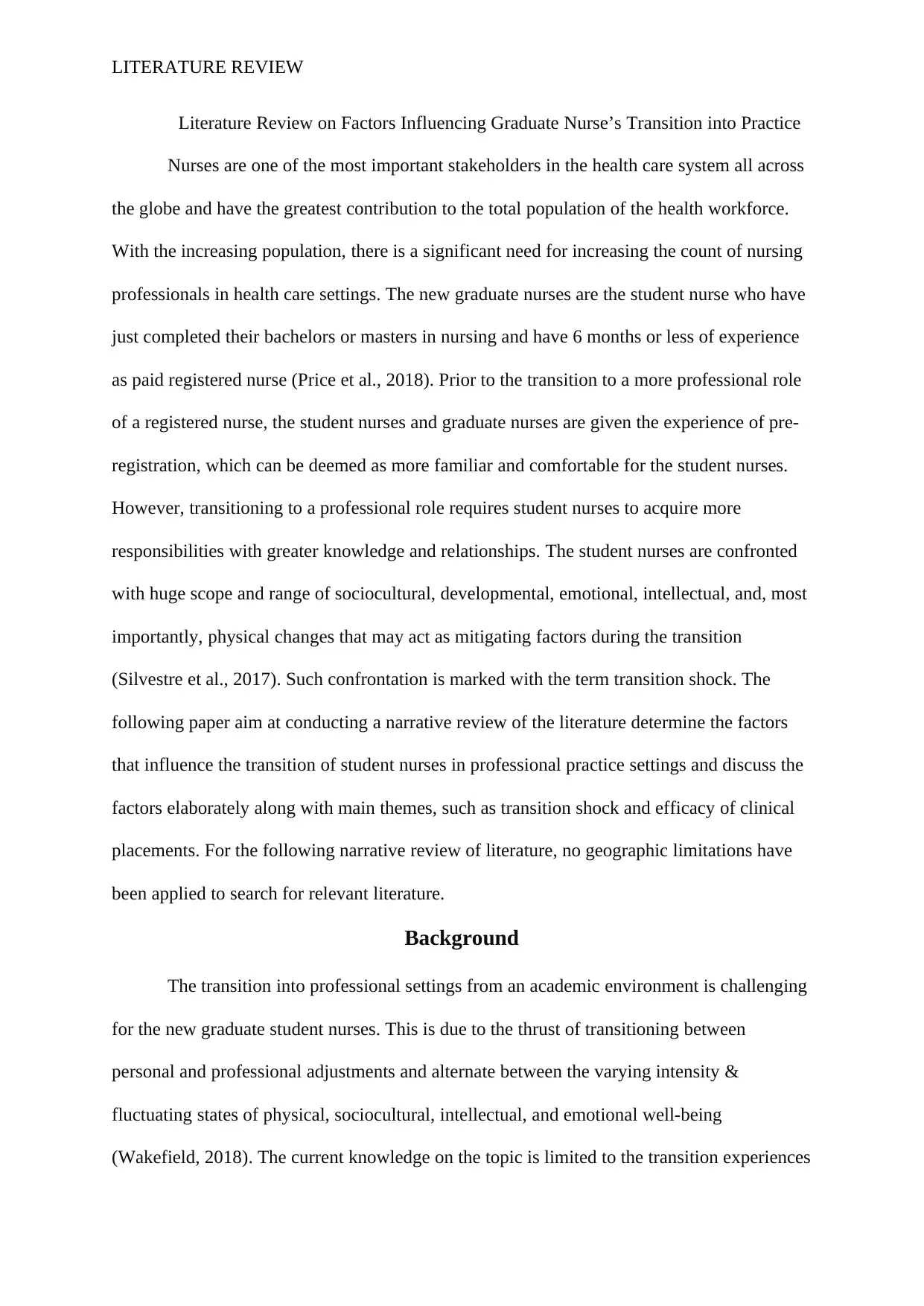
LITERATURE REVIEW
Literature Review on Factors Influencing Graduate Nurse’s Transition into Practice
Nurses are one of the most important stakeholders in the health care system all across
the globe and have the greatest contribution to the total population of the health workforce.
With the increasing population, there is a significant need for increasing the count of nursing
professionals in health care settings. The new graduate nurses are the student nurse who have
just completed their bachelors or masters in nursing and have 6 months or less of experience
as paid registered nurse (Price et al., 2018). Prior to the transition to a more professional role
of a registered nurse, the student nurses and graduate nurses are given the experience of pre-
registration, which can be deemed as more familiar and comfortable for the student nurses.
However, transitioning to a professional role requires student nurses to acquire more
responsibilities with greater knowledge and relationships. The student nurses are confronted
with huge scope and range of sociocultural, developmental, emotional, intellectual, and, most
importantly, physical changes that may act as mitigating factors during the transition
(Silvestre et al., 2017). Such confrontation is marked with the term transition shock. The
following paper aim at conducting a narrative review of the literature determine the factors
that influence the transition of student nurses in professional practice settings and discuss the
factors elaborately along with main themes, such as transition shock and efficacy of clinical
placements. For the following narrative review of literature, no geographic limitations have
been applied to search for relevant literature.
Background
The transition into professional settings from an academic environment is challenging
for the new graduate student nurses. This is due to the thrust of transitioning between
personal and professional adjustments and alternate between the varying intensity &
fluctuating states of physical, sociocultural, intellectual, and emotional well-being
(Wakefield, 2018). The current knowledge on the topic is limited to the transition experiences
Literature Review on Factors Influencing Graduate Nurse’s Transition into Practice
Nurses are one of the most important stakeholders in the health care system all across
the globe and have the greatest contribution to the total population of the health workforce.
With the increasing population, there is a significant need for increasing the count of nursing
professionals in health care settings. The new graduate nurses are the student nurse who have
just completed their bachelors or masters in nursing and have 6 months or less of experience
as paid registered nurse (Price et al., 2018). Prior to the transition to a more professional role
of a registered nurse, the student nurses and graduate nurses are given the experience of pre-
registration, which can be deemed as more familiar and comfortable for the student nurses.
However, transitioning to a professional role requires student nurses to acquire more
responsibilities with greater knowledge and relationships. The student nurses are confronted
with huge scope and range of sociocultural, developmental, emotional, intellectual, and, most
importantly, physical changes that may act as mitigating factors during the transition
(Silvestre et al., 2017). Such confrontation is marked with the term transition shock. The
following paper aim at conducting a narrative review of the literature determine the factors
that influence the transition of student nurses in professional practice settings and discuss the
factors elaborately along with main themes, such as transition shock and efficacy of clinical
placements. For the following narrative review of literature, no geographic limitations have
been applied to search for relevant literature.
Background
The transition into professional settings from an academic environment is challenging
for the new graduate student nurses. This is due to the thrust of transitioning between
personal and professional adjustments and alternate between the varying intensity &
fluctuating states of physical, sociocultural, intellectual, and emotional well-being
(Wakefield, 2018). The current knowledge on the topic is limited to the transition experiences
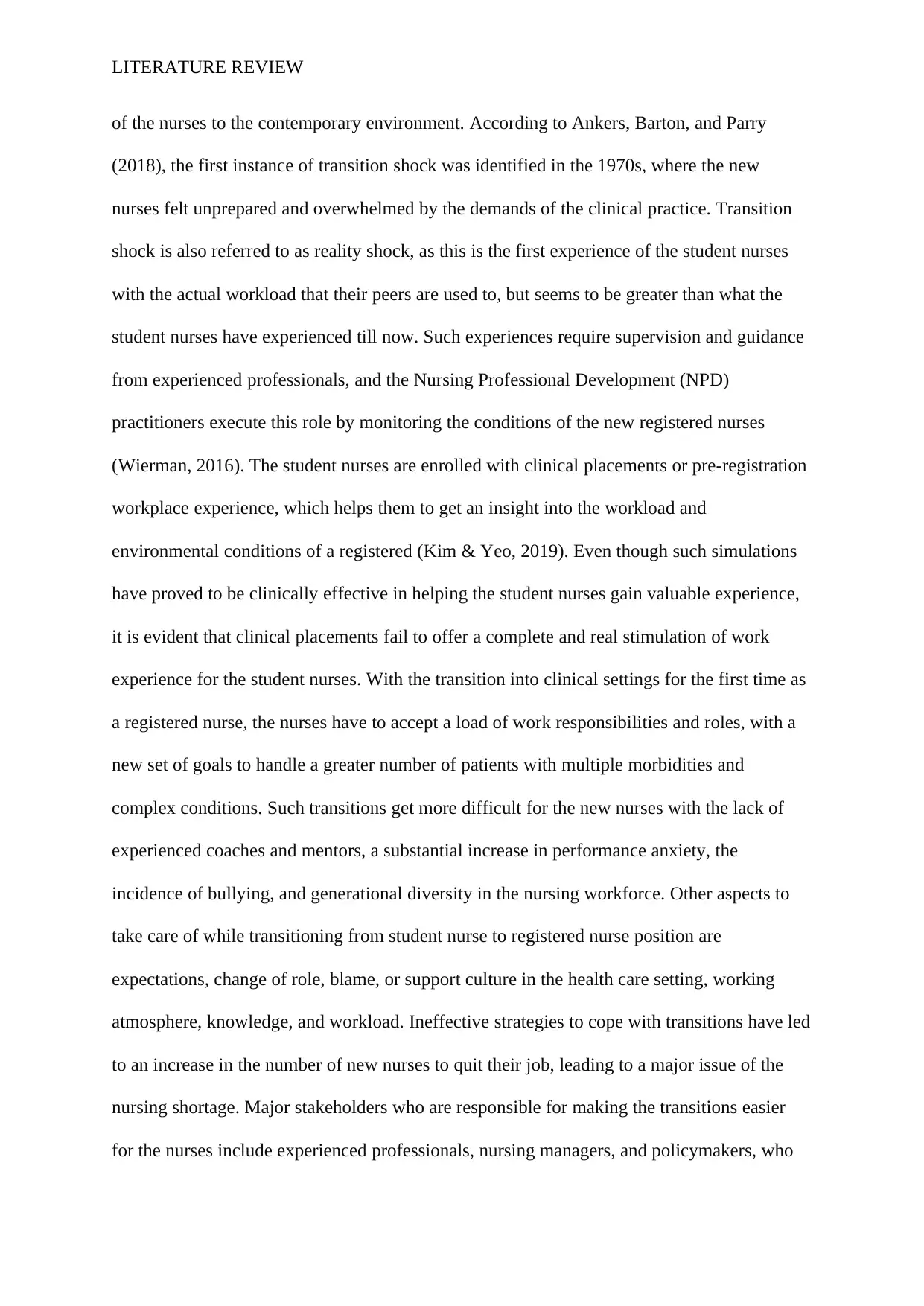
LITERATURE REVIEW
of the nurses to the contemporary environment. According to Ankers, Barton, and Parry
(2018), the first instance of transition shock was identified in the 1970s, where the new
nurses felt unprepared and overwhelmed by the demands of the clinical practice. Transition
shock is also referred to as reality shock, as this is the first experience of the student nurses
with the actual workload that their peers are used to, but seems to be greater than what the
student nurses have experienced till now. Such experiences require supervision and guidance
from experienced professionals, and the Nursing Professional Development (NPD)
practitioners execute this role by monitoring the conditions of the new registered nurses
(Wierman, 2016). The student nurses are enrolled with clinical placements or pre-registration
workplace experience, which helps them to get an insight into the workload and
environmental conditions of a registered (Kim & Yeo, 2019). Even though such simulations
have proved to be clinically effective in helping the student nurses gain valuable experience,
it is evident that clinical placements fail to offer a complete and real stimulation of work
experience for the student nurses. With the transition into clinical settings for the first time as
a registered nurse, the nurses have to accept a load of work responsibilities and roles, with a
new set of goals to handle a greater number of patients with multiple morbidities and
complex conditions. Such transitions get more difficult for the new nurses with the lack of
experienced coaches and mentors, a substantial increase in performance anxiety, the
incidence of bullying, and generational diversity in the nursing workforce. Other aspects to
take care of while transitioning from student nurse to registered nurse position are
expectations, change of role, blame, or support culture in the health care setting, working
atmosphere, knowledge, and workload. Ineffective strategies to cope with transitions have led
to an increase in the number of new nurses to quit their job, leading to a major issue of the
nursing shortage. Major stakeholders who are responsible for making the transitions easier
for the nurses include experienced professionals, nursing managers, and policymakers, who
of the nurses to the contemporary environment. According to Ankers, Barton, and Parry
(2018), the first instance of transition shock was identified in the 1970s, where the new
nurses felt unprepared and overwhelmed by the demands of the clinical practice. Transition
shock is also referred to as reality shock, as this is the first experience of the student nurses
with the actual workload that their peers are used to, but seems to be greater than what the
student nurses have experienced till now. Such experiences require supervision and guidance
from experienced professionals, and the Nursing Professional Development (NPD)
practitioners execute this role by monitoring the conditions of the new registered nurses
(Wierman, 2016). The student nurses are enrolled with clinical placements or pre-registration
workplace experience, which helps them to get an insight into the workload and
environmental conditions of a registered (Kim & Yeo, 2019). Even though such simulations
have proved to be clinically effective in helping the student nurses gain valuable experience,
it is evident that clinical placements fail to offer a complete and real stimulation of work
experience for the student nurses. With the transition into clinical settings for the first time as
a registered nurse, the nurses have to accept a load of work responsibilities and roles, with a
new set of goals to handle a greater number of patients with multiple morbidities and
complex conditions. Such transitions get more difficult for the new nurses with the lack of
experienced coaches and mentors, a substantial increase in performance anxiety, the
incidence of bullying, and generational diversity in the nursing workforce. Other aspects to
take care of while transitioning from student nurse to registered nurse position are
expectations, change of role, blame, or support culture in the health care setting, working
atmosphere, knowledge, and workload. Ineffective strategies to cope with transitions have led
to an increase in the number of new nurses to quit their job, leading to a major issue of the
nursing shortage. Major stakeholders who are responsible for making the transitions easier
for the nurses include experienced professionals, nursing managers, and policymakers, who
⊘ This is a preview!⊘
Do you want full access?
Subscribe today to unlock all pages.

Trusted by 1+ million students worldwide

LITERATURE REVIEW
can facilitate the transition process and help the nurses to cope with the consequences. The
negative consequences associated with transition shock include burnout danger, panic, fear,
tension, anxiety, and other endangers, which significantly increases when the higher
authorities fail to understand these changes and undermine the physical and mental health of
the nurses. The end results that may occur due to mismanagement of the consequences of
transition shock are job dissatisfaction, inability to fulfill responsibilities, poor job
motivation, projection, denial, fear, overdependence, and even isolation. The health outcomes
and safety of the patients are also endangered when the nursing individuals are facing such
issues, as such conditions may lead to the instance of medication errors.
Search Strategy
A search protocol is developed and followed to search for literature relevant to the
current research objective, which is to determine the factors that influence the new nurse’s
transition into clinical practice. The medical databases which were utilized to conduct the
search for literature will include PubMed Central, BioMed Central, and Cochrane Database
for Systematic Reviews. The use of specific keywords was ensured to increase the relevancy
of the search results, and the keywords were transition, new graduate nurse, student nurse,
transition shock, registered nurse, professional role, clinical practice, pre-registration, and
clinical placement. The use of Boolean operators was ensured to increase the count of
literature in the search results, and the two operators included ‘AND’ and ‘OR.’ The use of
the Boolean operator ‘AND’ was done to increase the count of literature in the search results,
and the use of operator ‘OR’ was done to refine the search and limit the results to include the
literature, which were highly relevant to the research topic. The advanced search option
available in the databases were used to include inclusion criteria, and only peer-reviewed
articles published in the last five years, that is, between 2016 and 2020, were selected for
final review. Other aspects of inclusion criteria include publishing language to be only
can facilitate the transition process and help the nurses to cope with the consequences. The
negative consequences associated with transition shock include burnout danger, panic, fear,
tension, anxiety, and other endangers, which significantly increases when the higher
authorities fail to understand these changes and undermine the physical and mental health of
the nurses. The end results that may occur due to mismanagement of the consequences of
transition shock are job dissatisfaction, inability to fulfill responsibilities, poor job
motivation, projection, denial, fear, overdependence, and even isolation. The health outcomes
and safety of the patients are also endangered when the nursing individuals are facing such
issues, as such conditions may lead to the instance of medication errors.
Search Strategy
A search protocol is developed and followed to search for literature relevant to the
current research objective, which is to determine the factors that influence the new nurse’s
transition into clinical practice. The medical databases which were utilized to conduct the
search for literature will include PubMed Central, BioMed Central, and Cochrane Database
for Systematic Reviews. The use of specific keywords was ensured to increase the relevancy
of the search results, and the keywords were transition, new graduate nurse, student nurse,
transition shock, registered nurse, professional role, clinical practice, pre-registration, and
clinical placement. The use of Boolean operators was ensured to increase the count of
literature in the search results, and the two operators included ‘AND’ and ‘OR.’ The use of
the Boolean operator ‘AND’ was done to increase the count of literature in the search results,
and the use of operator ‘OR’ was done to refine the search and limit the results to include the
literature, which were highly relevant to the research topic. The advanced search option
available in the databases were used to include inclusion criteria, and only peer-reviewed
articles published in the last five years, that is, between 2016 and 2020, were selected for
final review. Other aspects of inclusion criteria include publishing language to be only
Paraphrase This Document
Need a fresh take? Get an instant paraphrase of this document with our AI Paraphraser
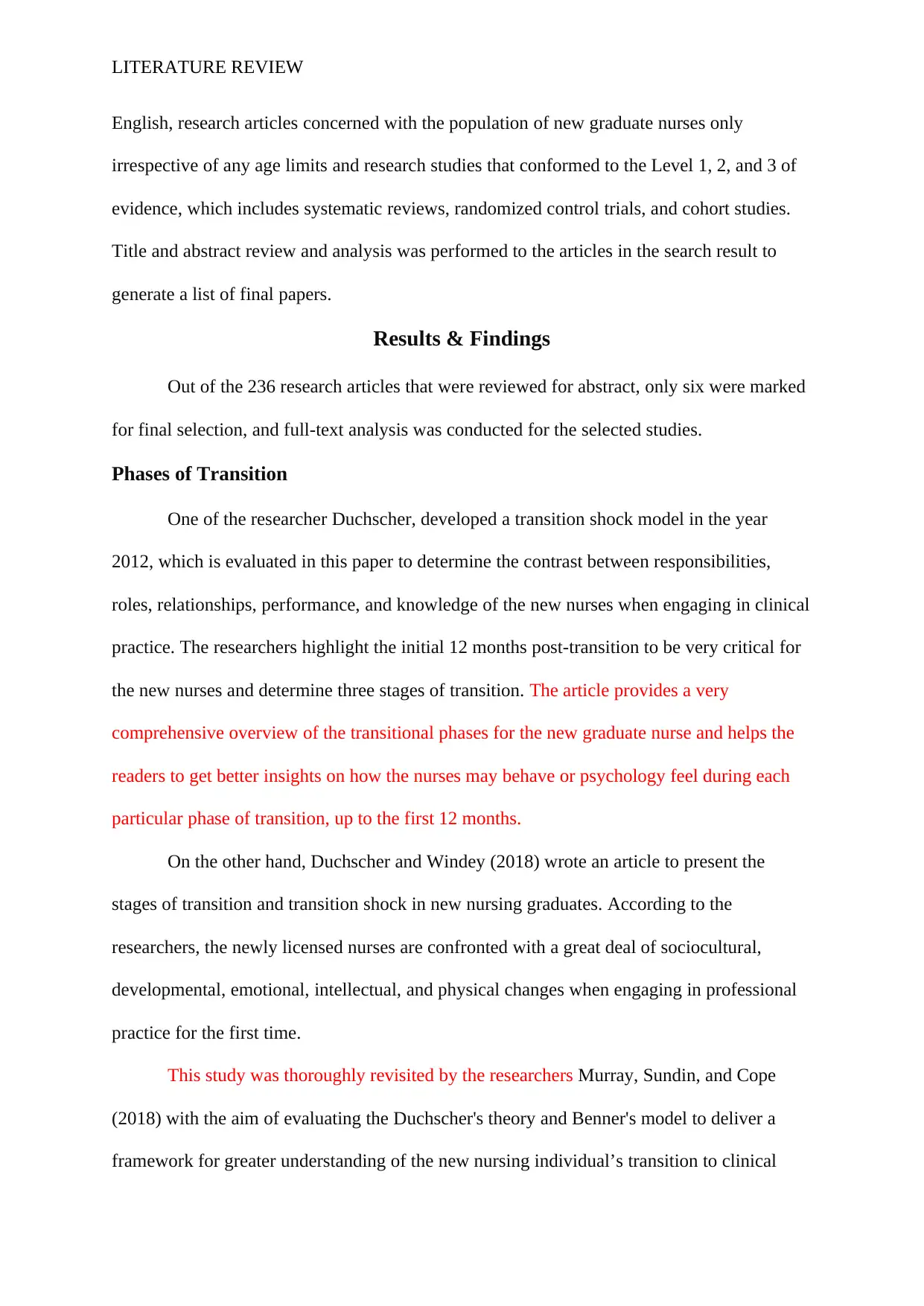
LITERATURE REVIEW
English, research articles concerned with the population of new graduate nurses only
irrespective of any age limits and research studies that conformed to the Level 1, 2, and 3 of
evidence, which includes systematic reviews, randomized control trials, and cohort studies.
Title and abstract review and analysis was performed to the articles in the search result to
generate a list of final papers.
Results & Findings
Out of the 236 research articles that were reviewed for abstract, only six were marked
for final selection, and full-text analysis was conducted for the selected studies.
Phases of Transition
One of the researcher Duchscher, developed a transition shock model in the year
2012, which is evaluated in this paper to determine the contrast between responsibilities,
roles, relationships, performance, and knowledge of the new nurses when engaging in clinical
practice. The researchers highlight the initial 12 months post-transition to be very critical for
the new nurses and determine three stages of transition. The article provides a very
comprehensive overview of the transitional phases for the new graduate nurse and helps the
readers to get better insights on how the nurses may behave or psychology feel during each
particular phase of transition, up to the first 12 months.
On the other hand, Duchscher and Windey (2018) wrote an article to present the
stages of transition and transition shock in new nursing graduates. According to the
researchers, the newly licensed nurses are confronted with a great deal of sociocultural,
developmental, emotional, intellectual, and physical changes when engaging in professional
practice for the first time.
This study was thoroughly revisited by the researchers Murray, Sundin, and Cope
(2018) with the aim of evaluating the Duchscher's theory and Benner's model to deliver a
framework for greater understanding of the new nursing individual’s transition to clinical
English, research articles concerned with the population of new graduate nurses only
irrespective of any age limits and research studies that conformed to the Level 1, 2, and 3 of
evidence, which includes systematic reviews, randomized control trials, and cohort studies.
Title and abstract review and analysis was performed to the articles in the search result to
generate a list of final papers.
Results & Findings
Out of the 236 research articles that were reviewed for abstract, only six were marked
for final selection, and full-text analysis was conducted for the selected studies.
Phases of Transition
One of the researcher Duchscher, developed a transition shock model in the year
2012, which is evaluated in this paper to determine the contrast between responsibilities,
roles, relationships, performance, and knowledge of the new nurses when engaging in clinical
practice. The researchers highlight the initial 12 months post-transition to be very critical for
the new nurses and determine three stages of transition. The article provides a very
comprehensive overview of the transitional phases for the new graduate nurse and helps the
readers to get better insights on how the nurses may behave or psychology feel during each
particular phase of transition, up to the first 12 months.
On the other hand, Duchscher and Windey (2018) wrote an article to present the
stages of transition and transition shock in new nursing graduates. According to the
researchers, the newly licensed nurses are confronted with a great deal of sociocultural,
developmental, emotional, intellectual, and physical changes when engaging in professional
practice for the first time.
This study was thoroughly revisited by the researchers Murray, Sundin, and Cope
(2018) with the aim of evaluating the Duchscher's theory and Benner's model to deliver a
framework for greater understanding of the new nursing individual’s transition to clinical
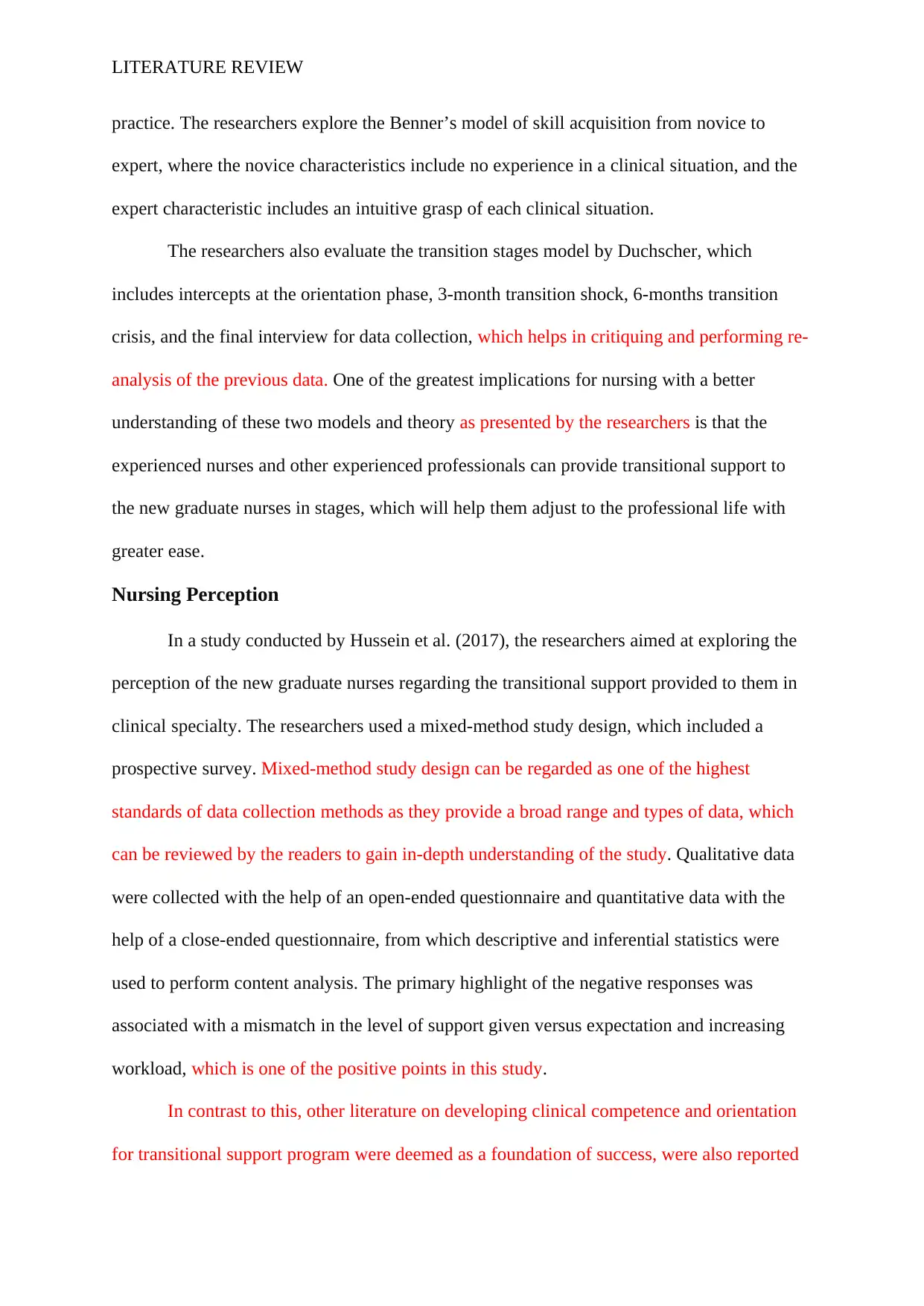
LITERATURE REVIEW
practice. The researchers explore the Benner’s model of skill acquisition from novice to
expert, where the novice characteristics include no experience in a clinical situation, and the
expert characteristic includes an intuitive grasp of each clinical situation.
The researchers also evaluate the transition stages model by Duchscher, which
includes intercepts at the orientation phase, 3-month transition shock, 6-months transition
crisis, and the final interview for data collection, which helps in critiquing and performing re-
analysis of the previous data. One of the greatest implications for nursing with a better
understanding of these two models and theory as presented by the researchers is that the
experienced nurses and other experienced professionals can provide transitional support to
the new graduate nurses in stages, which will help them adjust to the professional life with
greater ease.
Nursing Perception
In a study conducted by Hussein et al. (2017), the researchers aimed at exploring the
perception of the new graduate nurses regarding the transitional support provided to them in
clinical specialty. The researchers used a mixed-method study design, which included a
prospective survey. Mixed-method study design can be regarded as one of the highest
standards of data collection methods as they provide a broad range and types of data, which
can be reviewed by the readers to gain in-depth understanding of the study. Qualitative data
were collected with the help of an open-ended questionnaire and quantitative data with the
help of a close-ended questionnaire, from which descriptive and inferential statistics were
used to perform content analysis. The primary highlight of the negative responses was
associated with a mismatch in the level of support given versus expectation and increasing
workload, which is one of the positive points in this study.
In contrast to this, other literature on developing clinical competence and orientation
for transitional support program were deemed as a foundation of success, were also reported
practice. The researchers explore the Benner’s model of skill acquisition from novice to
expert, where the novice characteristics include no experience in a clinical situation, and the
expert characteristic includes an intuitive grasp of each clinical situation.
The researchers also evaluate the transition stages model by Duchscher, which
includes intercepts at the orientation phase, 3-month transition shock, 6-months transition
crisis, and the final interview for data collection, which helps in critiquing and performing re-
analysis of the previous data. One of the greatest implications for nursing with a better
understanding of these two models and theory as presented by the researchers is that the
experienced nurses and other experienced professionals can provide transitional support to
the new graduate nurses in stages, which will help them adjust to the professional life with
greater ease.
Nursing Perception
In a study conducted by Hussein et al. (2017), the researchers aimed at exploring the
perception of the new graduate nurses regarding the transitional support provided to them in
clinical specialty. The researchers used a mixed-method study design, which included a
prospective survey. Mixed-method study design can be regarded as one of the highest
standards of data collection methods as they provide a broad range and types of data, which
can be reviewed by the readers to gain in-depth understanding of the study. Qualitative data
were collected with the help of an open-ended questionnaire and quantitative data with the
help of a close-ended questionnaire, from which descriptive and inferential statistics were
used to perform content analysis. The primary highlight of the negative responses was
associated with a mismatch in the level of support given versus expectation and increasing
workload, which is one of the positive points in this study.
In contrast to this, other literature on developing clinical competence and orientation
for transitional support program were deemed as a foundation of success, were also reported
⊘ This is a preview!⊘
Do you want full access?
Subscribe today to unlock all pages.

Trusted by 1+ million students worldwide
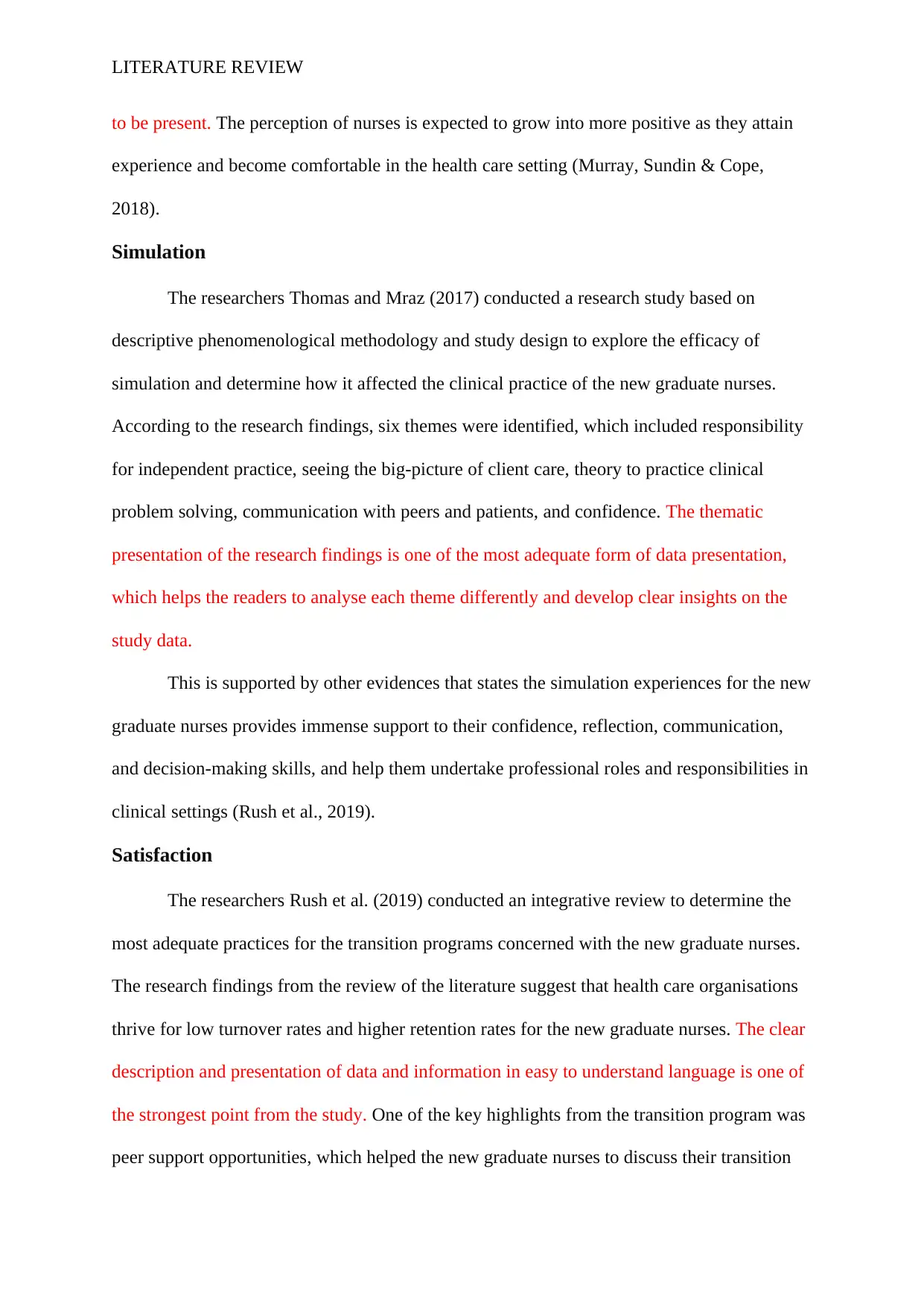
LITERATURE REVIEW
to be present. The perception of nurses is expected to grow into more positive as they attain
experience and become comfortable in the health care setting (Murray, Sundin & Cope,
2018).
Simulation
The researchers Thomas and Mraz (2017) conducted a research study based on
descriptive phenomenological methodology and study design to explore the efficacy of
simulation and determine how it affected the clinical practice of the new graduate nurses.
According to the research findings, six themes were identified, which included responsibility
for independent practice, seeing the big-picture of client care, theory to practice clinical
problem solving, communication with peers and patients, and confidence. The thematic
presentation of the research findings is one of the most adequate form of data presentation,
which helps the readers to analyse each theme differently and develop clear insights on the
study data.
This is supported by other evidences that states the simulation experiences for the new
graduate nurses provides immense support to their confidence, reflection, communication,
and decision-making skills, and help them undertake professional roles and responsibilities in
clinical settings (Rush et al., 2019).
Satisfaction
The researchers Rush et al. (2019) conducted an integrative review to determine the
most adequate practices for the transition programs concerned with the new graduate nurses.
The research findings from the review of the literature suggest that health care organisations
thrive for low turnover rates and higher retention rates for the new graduate nurses. The clear
description and presentation of data and information in easy to understand language is one of
the strongest point from the study. One of the key highlights from the transition program was
peer support opportunities, which helped the new graduate nurses to discuss their transition
to be present. The perception of nurses is expected to grow into more positive as they attain
experience and become comfortable in the health care setting (Murray, Sundin & Cope,
2018).
Simulation
The researchers Thomas and Mraz (2017) conducted a research study based on
descriptive phenomenological methodology and study design to explore the efficacy of
simulation and determine how it affected the clinical practice of the new graduate nurses.
According to the research findings, six themes were identified, which included responsibility
for independent practice, seeing the big-picture of client care, theory to practice clinical
problem solving, communication with peers and patients, and confidence. The thematic
presentation of the research findings is one of the most adequate form of data presentation,
which helps the readers to analyse each theme differently and develop clear insights on the
study data.
This is supported by other evidences that states the simulation experiences for the new
graduate nurses provides immense support to their confidence, reflection, communication,
and decision-making skills, and help them undertake professional roles and responsibilities in
clinical settings (Rush et al., 2019).
Satisfaction
The researchers Rush et al. (2019) conducted an integrative review to determine the
most adequate practices for the transition programs concerned with the new graduate nurses.
The research findings from the review of the literature suggest that health care organisations
thrive for low turnover rates and higher retention rates for the new graduate nurses. The clear
description and presentation of data and information in easy to understand language is one of
the strongest point from the study. One of the key highlights from the transition program was
peer support opportunities, which helped the new graduate nurses to discuss their transition
Paraphrase This Document
Need a fresh take? Get an instant paraphrase of this document with our AI Paraphraser
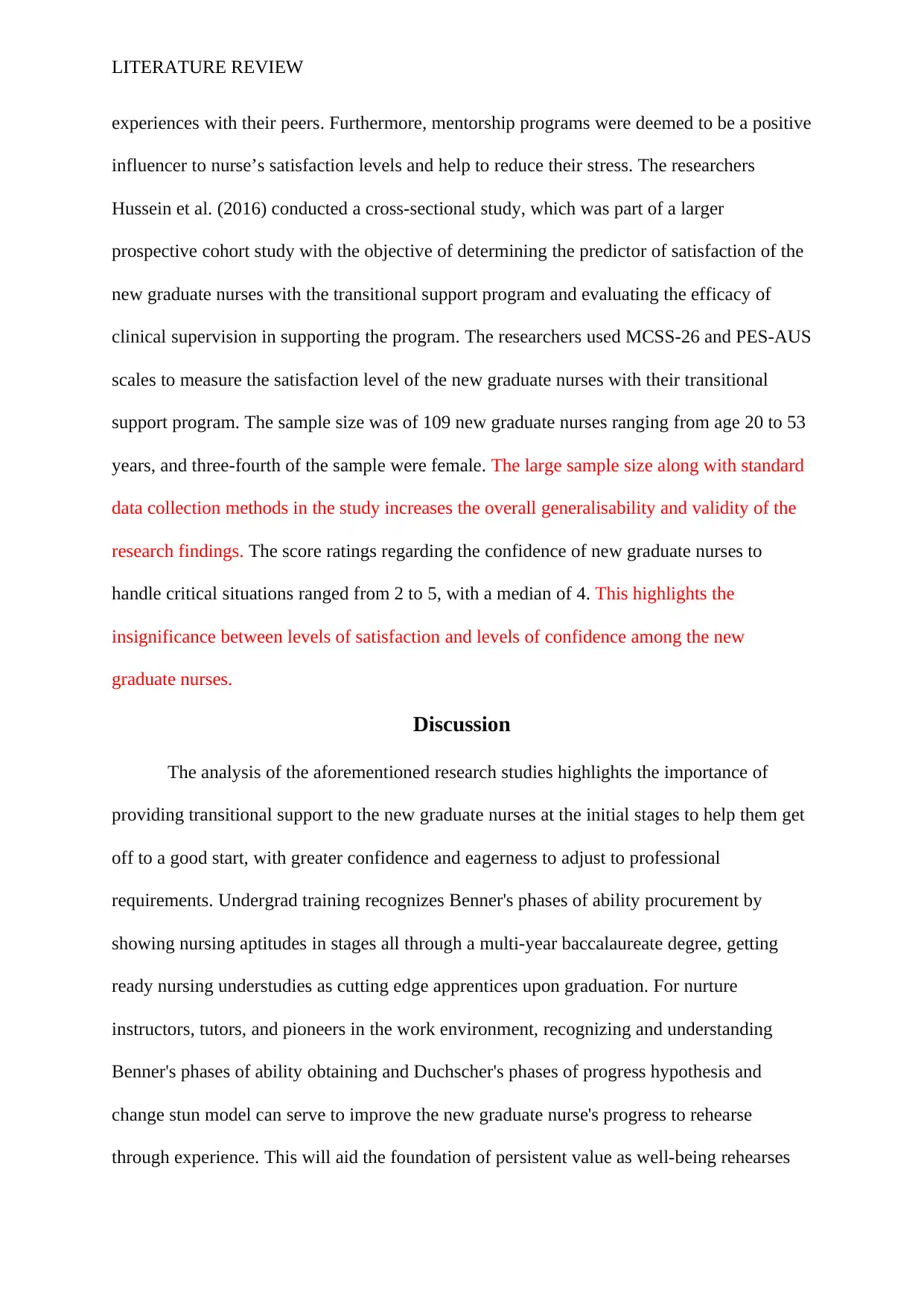
LITERATURE REVIEW
experiences with their peers. Furthermore, mentorship programs were deemed to be a positive
influencer to nurse’s satisfaction levels and help to reduce their stress. The researchers
Hussein et al. (2016) conducted a cross-sectional study, which was part of a larger
prospective cohort study with the objective of determining the predictor of satisfaction of the
new graduate nurses with the transitional support program and evaluating the efficacy of
clinical supervision in supporting the program. The researchers used MCSS-26 and PES-AUS
scales to measure the satisfaction level of the new graduate nurses with their transitional
support program. The sample size was of 109 new graduate nurses ranging from age 20 to 53
years, and three-fourth of the sample were female. The large sample size along with standard
data collection methods in the study increases the overall generalisability and validity of the
research findings. The score ratings regarding the confidence of new graduate nurses to
handle critical situations ranged from 2 to 5, with a median of 4. This highlights the
insignificance between levels of satisfaction and levels of confidence among the new
graduate nurses.
Discussion
The analysis of the aforementioned research studies highlights the importance of
providing transitional support to the new graduate nurses at the initial stages to help them get
off to a good start, with greater confidence and eagerness to adjust to professional
requirements. Undergrad training recognizes Benner's phases of ability procurement by
showing nursing aptitudes in stages all through a multi-year baccalaureate degree, getting
ready nursing understudies as cutting edge apprentices upon graduation. For nurture
instructors, tutors, and pioneers in the work environment, recognizing and understanding
Benner's phases of ability obtaining and Duchscher's phases of progress hypothesis and
change stun model can serve to improve the new graduate nurse's progress to rehearse
through experience. This will aid the foundation of persistent value as well-being rehearses
experiences with their peers. Furthermore, mentorship programs were deemed to be a positive
influencer to nurse’s satisfaction levels and help to reduce their stress. The researchers
Hussein et al. (2016) conducted a cross-sectional study, which was part of a larger
prospective cohort study with the objective of determining the predictor of satisfaction of the
new graduate nurses with the transitional support program and evaluating the efficacy of
clinical supervision in supporting the program. The researchers used MCSS-26 and PES-AUS
scales to measure the satisfaction level of the new graduate nurses with their transitional
support program. The sample size was of 109 new graduate nurses ranging from age 20 to 53
years, and three-fourth of the sample were female. The large sample size along with standard
data collection methods in the study increases the overall generalisability and validity of the
research findings. The score ratings regarding the confidence of new graduate nurses to
handle critical situations ranged from 2 to 5, with a median of 4. This highlights the
insignificance between levels of satisfaction and levels of confidence among the new
graduate nurses.
Discussion
The analysis of the aforementioned research studies highlights the importance of
providing transitional support to the new graduate nurses at the initial stages to help them get
off to a good start, with greater confidence and eagerness to adjust to professional
requirements. Undergrad training recognizes Benner's phases of ability procurement by
showing nursing aptitudes in stages all through a multi-year baccalaureate degree, getting
ready nursing understudies as cutting edge apprentices upon graduation. For nurture
instructors, tutors, and pioneers in the work environment, recognizing and understanding
Benner's phases of ability obtaining and Duchscher's phases of progress hypothesis and
change stun model can serve to improve the new graduate nurse's progress to rehearse
through experience. This will aid the foundation of persistent value as well-being rehearses
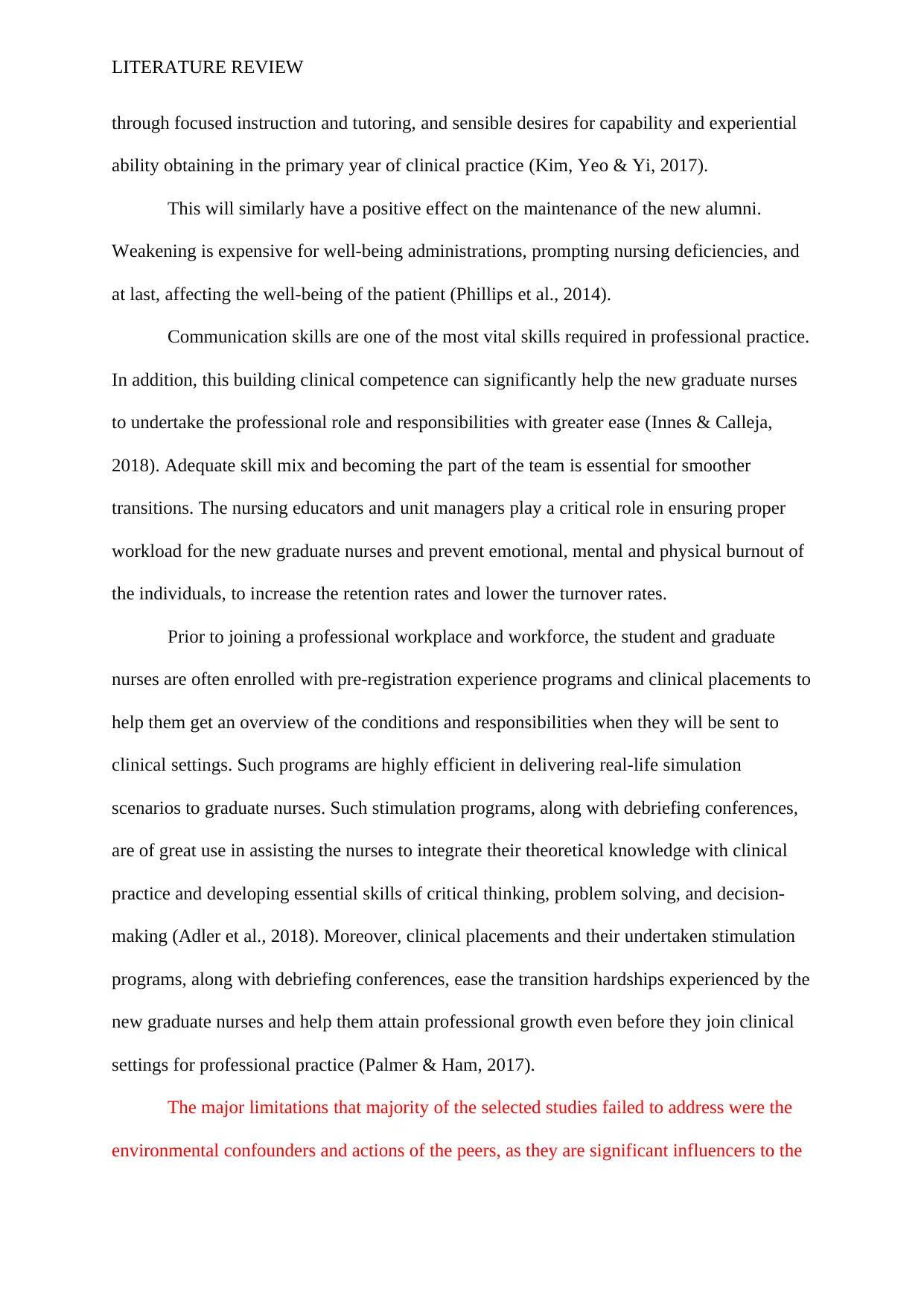
LITERATURE REVIEW
through focused instruction and tutoring, and sensible desires for capability and experiential
ability obtaining in the primary year of clinical practice (Kim, Yeo & Yi, 2017).
This will similarly have a positive effect on the maintenance of the new alumni.
Weakening is expensive for well-being administrations, prompting nursing deficiencies, and
at last, affecting the well-being of the patient (Phillips et al., 2014).
Communication skills are one of the most vital skills required in professional practice.
In addition, this building clinical competence can significantly help the new graduate nurses
to undertake the professional role and responsibilities with greater ease (Innes & Calleja,
2018). Adequate skill mix and becoming the part of the team is essential for smoother
transitions. The nursing educators and unit managers play a critical role in ensuring proper
workload for the new graduate nurses and prevent emotional, mental and physical burnout of
the individuals, to increase the retention rates and lower the turnover rates.
Prior to joining a professional workplace and workforce, the student and graduate
nurses are often enrolled with pre-registration experience programs and clinical placements to
help them get an overview of the conditions and responsibilities when they will be sent to
clinical settings. Such programs are highly efficient in delivering real-life simulation
scenarios to graduate nurses. Such stimulation programs, along with debriefing conferences,
are of great use in assisting the nurses to integrate their theoretical knowledge with clinical
practice and developing essential skills of critical thinking, problem solving, and decision-
making (Adler et al., 2018). Moreover, clinical placements and their undertaken stimulation
programs, along with debriefing conferences, ease the transition hardships experienced by the
new graduate nurses and help them attain professional growth even before they join clinical
settings for professional practice (Palmer & Ham, 2017).
The major limitations that majority of the selected studies failed to address were the
environmental confounders and actions of the peers, as they are significant influencers to the
through focused instruction and tutoring, and sensible desires for capability and experiential
ability obtaining in the primary year of clinical practice (Kim, Yeo & Yi, 2017).
This will similarly have a positive effect on the maintenance of the new alumni.
Weakening is expensive for well-being administrations, prompting nursing deficiencies, and
at last, affecting the well-being of the patient (Phillips et al., 2014).
Communication skills are one of the most vital skills required in professional practice.
In addition, this building clinical competence can significantly help the new graduate nurses
to undertake the professional role and responsibilities with greater ease (Innes & Calleja,
2018). Adequate skill mix and becoming the part of the team is essential for smoother
transitions. The nursing educators and unit managers play a critical role in ensuring proper
workload for the new graduate nurses and prevent emotional, mental and physical burnout of
the individuals, to increase the retention rates and lower the turnover rates.
Prior to joining a professional workplace and workforce, the student and graduate
nurses are often enrolled with pre-registration experience programs and clinical placements to
help them get an overview of the conditions and responsibilities when they will be sent to
clinical settings. Such programs are highly efficient in delivering real-life simulation
scenarios to graduate nurses. Such stimulation programs, along with debriefing conferences,
are of great use in assisting the nurses to integrate their theoretical knowledge with clinical
practice and developing essential skills of critical thinking, problem solving, and decision-
making (Adler et al., 2018). Moreover, clinical placements and their undertaken stimulation
programs, along with debriefing conferences, ease the transition hardships experienced by the
new graduate nurses and help them attain professional growth even before they join clinical
settings for professional practice (Palmer & Ham, 2017).
The major limitations that majority of the selected studies failed to address were the
environmental confounders and actions of the peers, as they are significant influencers to the
⊘ This is a preview!⊘
Do you want full access?
Subscribe today to unlock all pages.

Trusted by 1+ million students worldwide
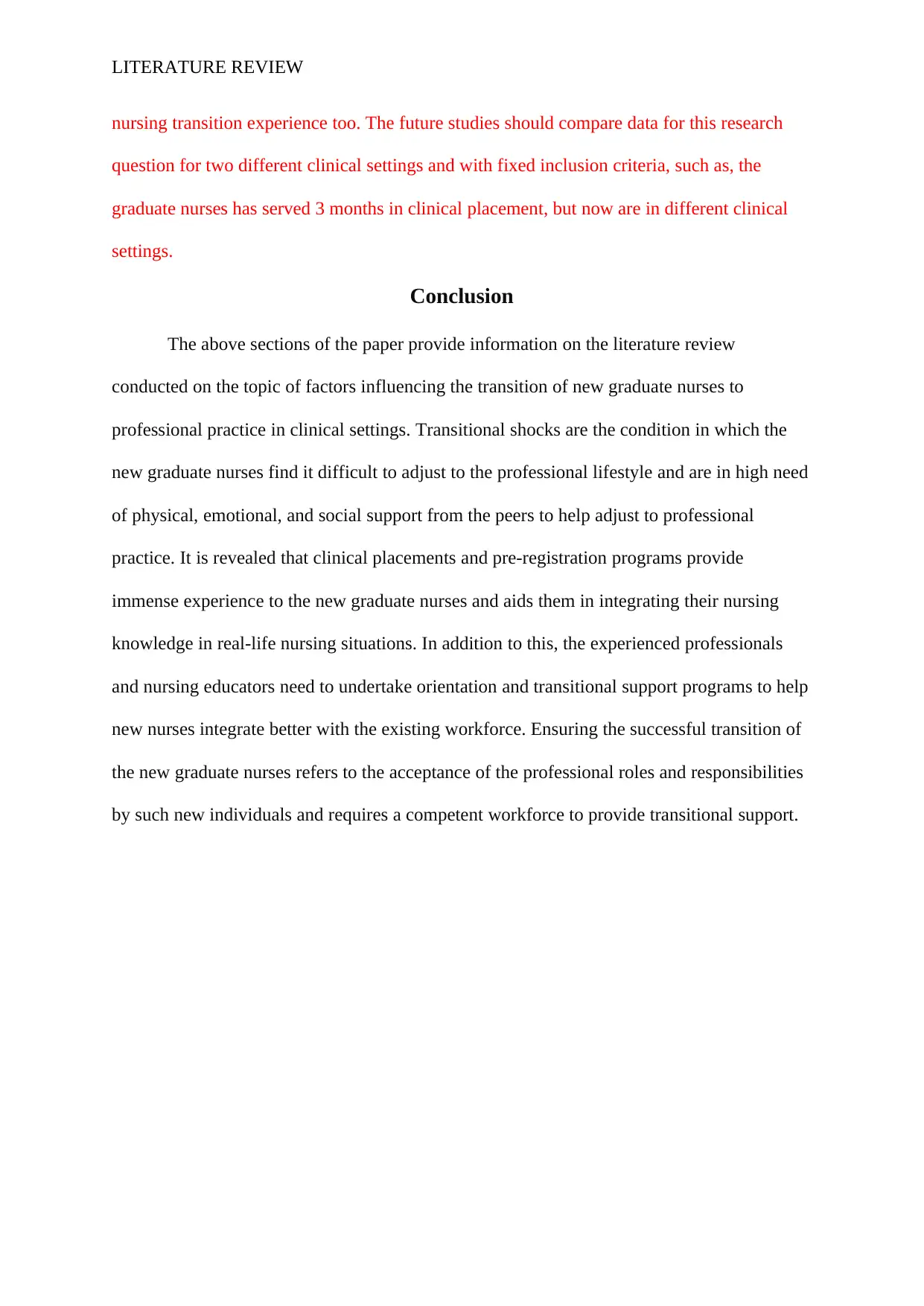
LITERATURE REVIEW
nursing transition experience too. The future studies should compare data for this research
question for two different clinical settings and with fixed inclusion criteria, such as, the
graduate nurses has served 3 months in clinical placement, but now are in different clinical
settings.
Conclusion
The above sections of the paper provide information on the literature review
conducted on the topic of factors influencing the transition of new graduate nurses to
professional practice in clinical settings. Transitional shocks are the condition in which the
new graduate nurses find it difficult to adjust to the professional lifestyle and are in high need
of physical, emotional, and social support from the peers to help adjust to professional
practice. It is revealed that clinical placements and pre-registration programs provide
immense experience to the new graduate nurses and aids them in integrating their nursing
knowledge in real-life nursing situations. In addition to this, the experienced professionals
and nursing educators need to undertake orientation and transitional support programs to help
new nurses integrate better with the existing workforce. Ensuring the successful transition of
the new graduate nurses refers to the acceptance of the professional roles and responsibilities
by such new individuals and requires a competent workforce to provide transitional support.
nursing transition experience too. The future studies should compare data for this research
question for two different clinical settings and with fixed inclusion criteria, such as, the
graduate nurses has served 3 months in clinical placement, but now are in different clinical
settings.
Conclusion
The above sections of the paper provide information on the literature review
conducted on the topic of factors influencing the transition of new graduate nurses to
professional practice in clinical settings. Transitional shocks are the condition in which the
new graduate nurses find it difficult to adjust to the professional lifestyle and are in high need
of physical, emotional, and social support from the peers to help adjust to professional
practice. It is revealed that clinical placements and pre-registration programs provide
immense experience to the new graduate nurses and aids them in integrating their nursing
knowledge in real-life nursing situations. In addition to this, the experienced professionals
and nursing educators need to undertake orientation and transitional support programs to help
new nurses integrate better with the existing workforce. Ensuring the successful transition of
the new graduate nurses refers to the acceptance of the professional roles and responsibilities
by such new individuals and requires a competent workforce to provide transitional support.
Paraphrase This Document
Need a fresh take? Get an instant paraphrase of this document with our AI Paraphraser
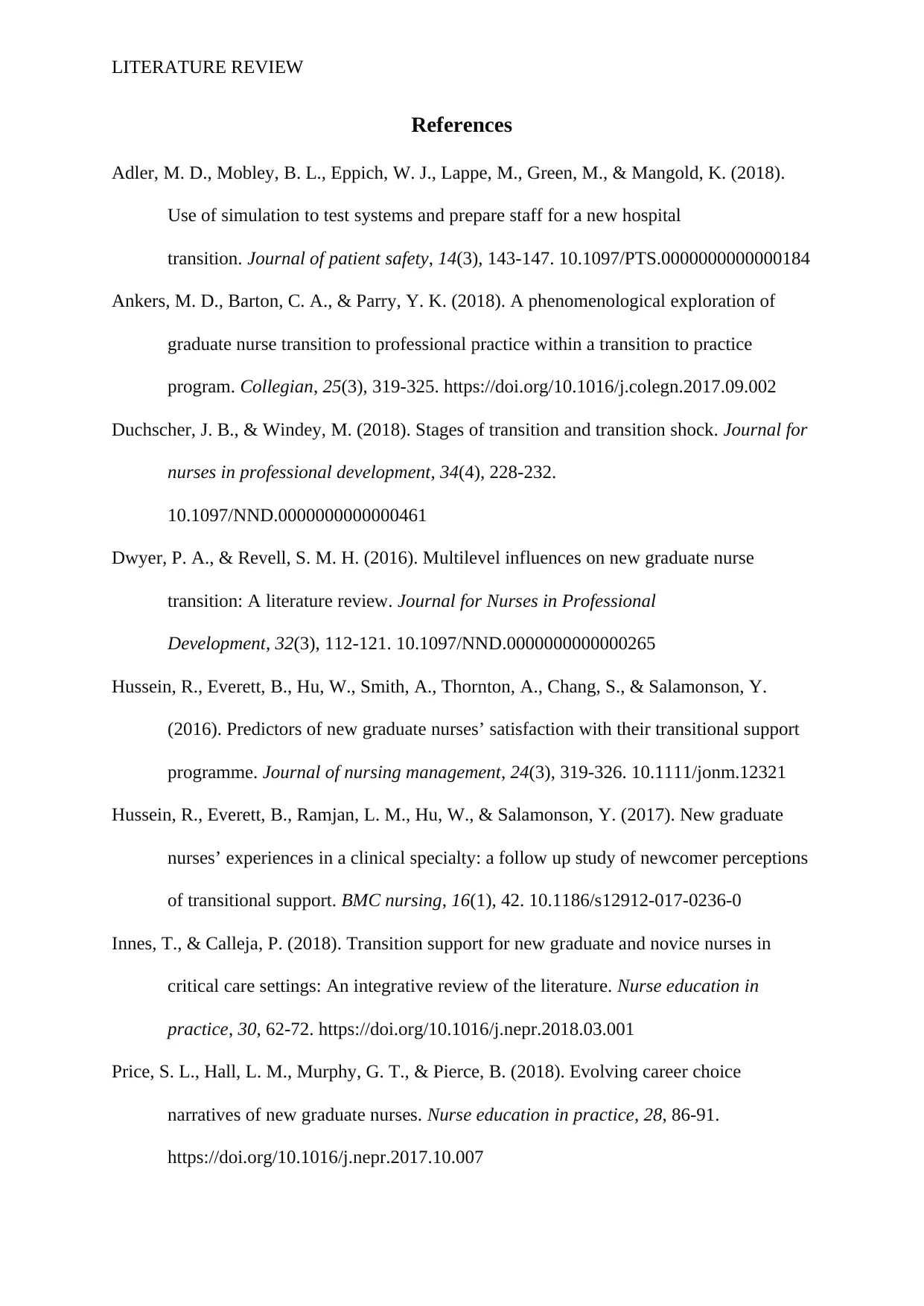
LITERATURE REVIEW
References
Adler, M. D., Mobley, B. L., Eppich, W. J., Lappe, M., Green, M., & Mangold, K. (2018).
Use of simulation to test systems and prepare staff for a new hospital
transition. Journal of patient safety, 14(3), 143-147. 10.1097/PTS.0000000000000184
Ankers, M. D., Barton, C. A., & Parry, Y. K. (2018). A phenomenological exploration of
graduate nurse transition to professional practice within a transition to practice
program. Collegian, 25(3), 319-325. https://doi.org/10.1016/j.colegn.2017.09.002
Duchscher, J. B., & Windey, M. (2018). Stages of transition and transition shock. Journal for
nurses in professional development, 34(4), 228-232.
10.1097/NND.0000000000000461
Dwyer, P. A., & Revell, S. M. H. (2016). Multilevel influences on new graduate nurse
transition: A literature review. Journal for Nurses in Professional
Development, 32(3), 112-121. 10.1097/NND.0000000000000265
Hussein, R., Everett, B., Hu, W., Smith, A., Thornton, A., Chang, S., & Salamonson, Y.
(2016). Predictors of new graduate nurses’ satisfaction with their transitional support
programme. Journal of nursing management, 24(3), 319-326. 10.1111/jonm.12321
Hussein, R., Everett, B., Ramjan, L. M., Hu, W., & Salamonson, Y. (2017). New graduate
nurses’ experiences in a clinical specialty: a follow up study of newcomer perceptions
of transitional support. BMC nursing, 16(1), 42. 10.1186/s12912-017-0236-0
Innes, T., & Calleja, P. (2018). Transition support for new graduate and novice nurses in
critical care settings: An integrative review of the literature. Nurse education in
practice, 30, 62-72. https://doi.org/10.1016/j.nepr.2018.03.001
Price, S. L., Hall, L. M., Murphy, G. T., & Pierce, B. (2018). Evolving career choice
narratives of new graduate nurses. Nurse education in practice, 28, 86-91.
https://doi.org/10.1016/j.nepr.2017.10.007
References
Adler, M. D., Mobley, B. L., Eppich, W. J., Lappe, M., Green, M., & Mangold, K. (2018).
Use of simulation to test systems and prepare staff for a new hospital
transition. Journal of patient safety, 14(3), 143-147. 10.1097/PTS.0000000000000184
Ankers, M. D., Barton, C. A., & Parry, Y. K. (2018). A phenomenological exploration of
graduate nurse transition to professional practice within a transition to practice
program. Collegian, 25(3), 319-325. https://doi.org/10.1016/j.colegn.2017.09.002
Duchscher, J. B., & Windey, M. (2018). Stages of transition and transition shock. Journal for
nurses in professional development, 34(4), 228-232.
10.1097/NND.0000000000000461
Dwyer, P. A., & Revell, S. M. H. (2016). Multilevel influences on new graduate nurse
transition: A literature review. Journal for Nurses in Professional
Development, 32(3), 112-121. 10.1097/NND.0000000000000265
Hussein, R., Everett, B., Hu, W., Smith, A., Thornton, A., Chang, S., & Salamonson, Y.
(2016). Predictors of new graduate nurses’ satisfaction with their transitional support
programme. Journal of nursing management, 24(3), 319-326. 10.1111/jonm.12321
Hussein, R., Everett, B., Ramjan, L. M., Hu, W., & Salamonson, Y. (2017). New graduate
nurses’ experiences in a clinical specialty: a follow up study of newcomer perceptions
of transitional support. BMC nursing, 16(1), 42. 10.1186/s12912-017-0236-0
Innes, T., & Calleja, P. (2018). Transition support for new graduate and novice nurses in
critical care settings: An integrative review of the literature. Nurse education in
practice, 30, 62-72. https://doi.org/10.1016/j.nepr.2018.03.001
Price, S. L., Hall, L. M., Murphy, G. T., & Pierce, B. (2018). Evolving career choice
narratives of new graduate nurses. Nurse education in practice, 28, 86-91.
https://doi.org/10.1016/j.nepr.2017.10.007
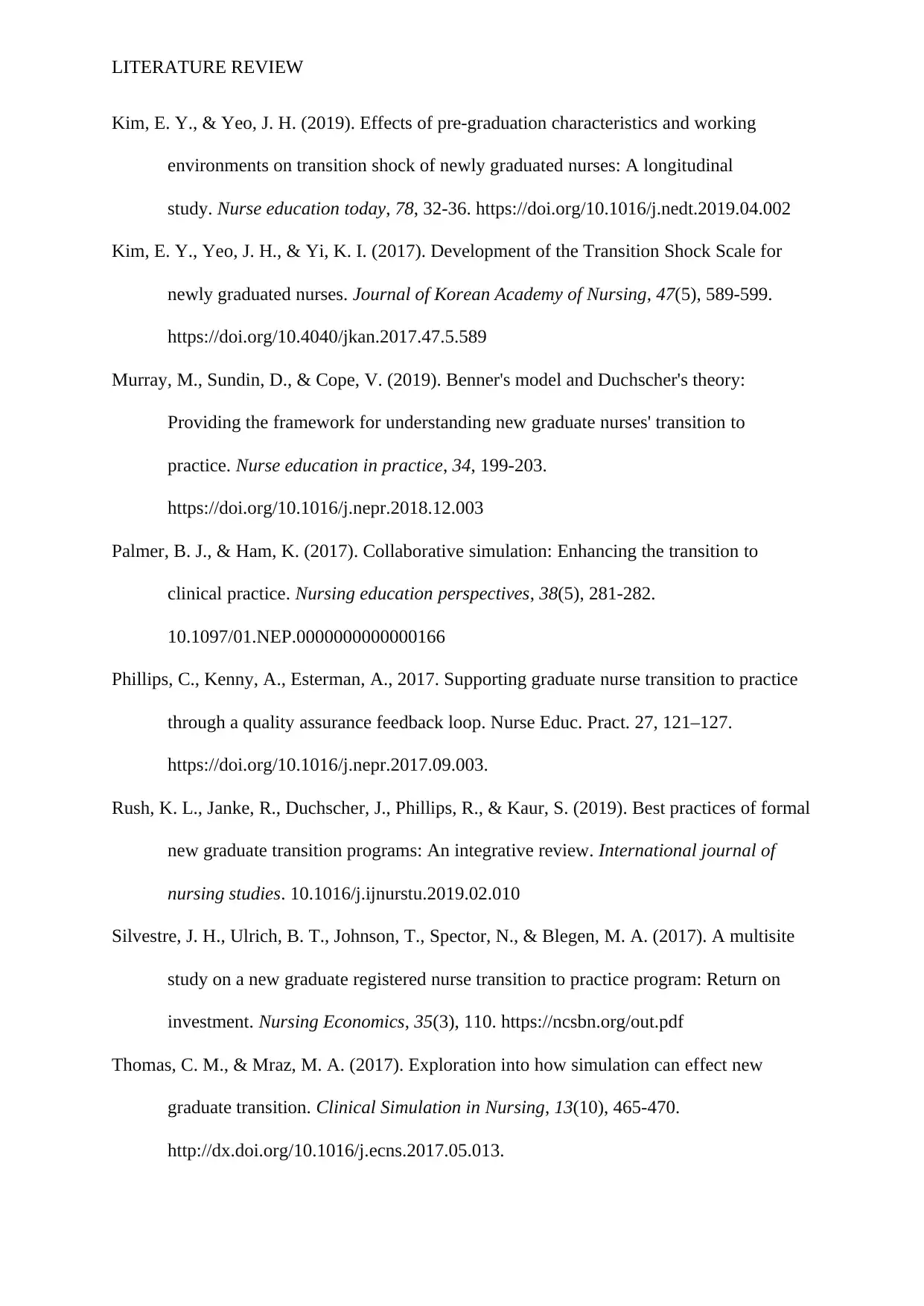
LITERATURE REVIEW
Kim, E. Y., & Yeo, J. H. (2019). Effects of pre-graduation characteristics and working
environments on transition shock of newly graduated nurses: A longitudinal
study. Nurse education today, 78, 32-36. https://doi.org/10.1016/j.nedt.2019.04.002
Kim, E. Y., Yeo, J. H., & Yi, K. I. (2017). Development of the Transition Shock Scale for
newly graduated nurses. Journal of Korean Academy of Nursing, 47(5), 589-599.
https://doi.org/10.4040/jkan.2017.47.5.589
Murray, M., Sundin, D., & Cope, V. (2019). Benner's model and Duchscher's theory:
Providing the framework for understanding new graduate nurses' transition to
practice. Nurse education in practice, 34, 199-203.
https://doi.org/10.1016/j.nepr.2018.12.003
Palmer, B. J., & Ham, K. (2017). Collaborative simulation: Enhancing the transition to
clinical practice. Nursing education perspectives, 38(5), 281-282.
10.1097/01.NEP.0000000000000166
Phillips, C., Kenny, A., Esterman, A., 2017. Supporting graduate nurse transition to practice
through a quality assurance feedback loop. Nurse Educ. Pract. 27, 121–127.
https://doi.org/10.1016/j.nepr.2017.09.003.
Rush, K. L., Janke, R., Duchscher, J., Phillips, R., & Kaur, S. (2019). Best practices of formal
new graduate transition programs: An integrative review. International journal of
nursing studies. 10.1016/j.ijnurstu.2019.02.010
Silvestre, J. H., Ulrich, B. T., Johnson, T., Spector, N., & Blegen, M. A. (2017). A multisite
study on a new graduate registered nurse transition to practice program: Return on
investment. Nursing Economics, 35(3), 110. https://ncsbn.org/out.pdf
Thomas, C. M., & Mraz, M. A. (2017). Exploration into how simulation can effect new
graduate transition. Clinical Simulation in Nursing, 13(10), 465-470.
http://dx.doi.org/10.1016/j.ecns.2017.05.013.
Kim, E. Y., & Yeo, J. H. (2019). Effects of pre-graduation characteristics and working
environments on transition shock of newly graduated nurses: A longitudinal
study. Nurse education today, 78, 32-36. https://doi.org/10.1016/j.nedt.2019.04.002
Kim, E. Y., Yeo, J. H., & Yi, K. I. (2017). Development of the Transition Shock Scale for
newly graduated nurses. Journal of Korean Academy of Nursing, 47(5), 589-599.
https://doi.org/10.4040/jkan.2017.47.5.589
Murray, M., Sundin, D., & Cope, V. (2019). Benner's model and Duchscher's theory:
Providing the framework for understanding new graduate nurses' transition to
practice. Nurse education in practice, 34, 199-203.
https://doi.org/10.1016/j.nepr.2018.12.003
Palmer, B. J., & Ham, K. (2017). Collaborative simulation: Enhancing the transition to
clinical practice. Nursing education perspectives, 38(5), 281-282.
10.1097/01.NEP.0000000000000166
Phillips, C., Kenny, A., Esterman, A., 2017. Supporting graduate nurse transition to practice
through a quality assurance feedback loop. Nurse Educ. Pract. 27, 121–127.
https://doi.org/10.1016/j.nepr.2017.09.003.
Rush, K. L., Janke, R., Duchscher, J., Phillips, R., & Kaur, S. (2019). Best practices of formal
new graduate transition programs: An integrative review. International journal of
nursing studies. 10.1016/j.ijnurstu.2019.02.010
Silvestre, J. H., Ulrich, B. T., Johnson, T., Spector, N., & Blegen, M. A. (2017). A multisite
study on a new graduate registered nurse transition to practice program: Return on
investment. Nursing Economics, 35(3), 110. https://ncsbn.org/out.pdf
Thomas, C. M., & Mraz, M. A. (2017). Exploration into how simulation can effect new
graduate transition. Clinical Simulation in Nursing, 13(10), 465-470.
http://dx.doi.org/10.1016/j.ecns.2017.05.013.
⊘ This is a preview!⊘
Do you want full access?
Subscribe today to unlock all pages.

Trusted by 1+ million students worldwide
1 out of 13
Related Documents
Your All-in-One AI-Powered Toolkit for Academic Success.
+13062052269
info@desklib.com
Available 24*7 on WhatsApp / Email
![[object Object]](/_next/static/media/star-bottom.7253800d.svg)
Unlock your academic potential
Copyright © 2020–2026 A2Z Services. All Rights Reserved. Developed and managed by ZUCOL.





